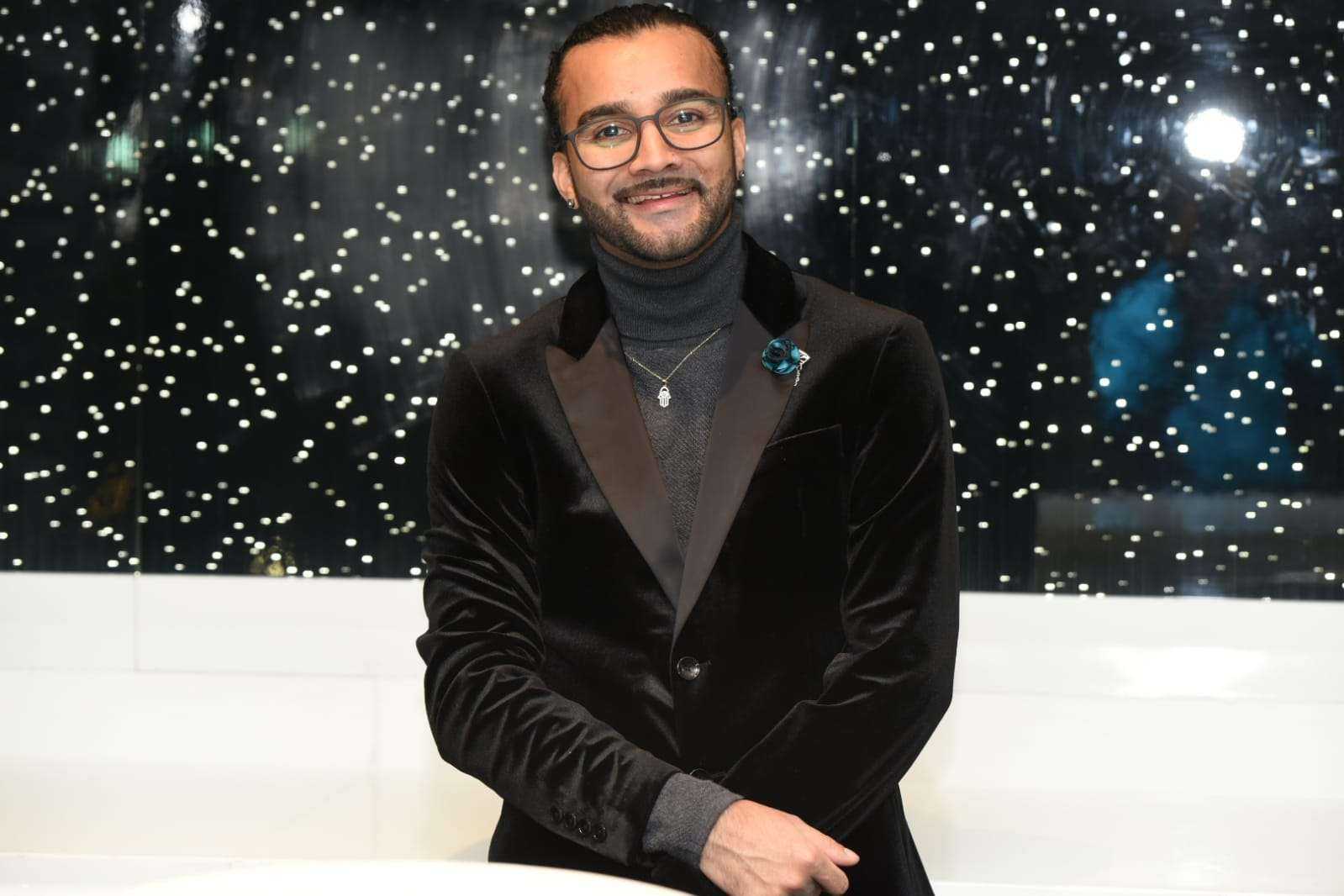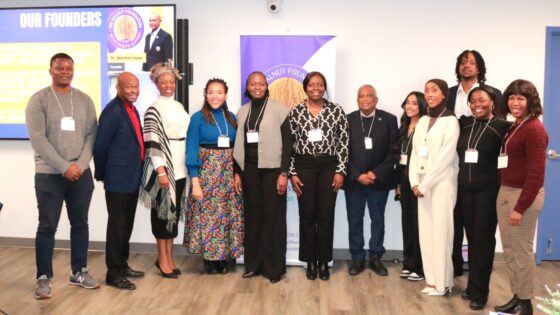on
BY SELINA McCALLUM
This classic man was recently hired as Cardi B’s official world tour videographer, but his success didn’t come overnight.
Kieran Khan, the youngest of three, was born in Guyana and raised in Trinidad and Tabago for a short while before moving to the Bronx for his childhood and young adulthood. In 2005, he moved to Canada, but went back to Trinidad in 2006.
He owned a night club on the island on the avenue and saw firsthand how full coverage of events including videos and social media promotion was almost non-existent. One company that he hired regularly for his events in the club is called Lime.tt, founded by Justin Gosein.
Unfortunately, in 2012 he had to close down the club, and although he didn’t know it yet, this was the start of his journey in content creation.
“Trinidad had a curfew because of the crime rate that had developed, I believe it was in 2012, and then we had to close down the night club, so I came back home to Canada,” said Khan. “During that time, I went back to my 9-5 job which was doing collections for a company.”
Since Khan knew the business of event coverage, he noticed that it was also lacking in Caribbean events and parties in Toronto, he decided to call Gosein.
“I called him up and said, ‘hey there seems to be this gap in terms of professional media coverage for the Caribbean community, you guys should really try to launch an office over here,’” said Khan. “And he said, ‘well why don’t you do that over there.’”
Khan become an equal partner plus managed that side of the business himself, but he had absolutely no experience in photography and videography when he started.
“I never shot video, I never shot photos before, I’ve never done any of it, but I had a few friends in the industry. We couldn’t afford to pay staff, so we started on our own,”
Then, Khan established himself in the Caribbean community by making a remarkable business decision.
“We provided free content for one year in Toronto. We established relationships and trading and gained experience. The year after is when we started monetizing Lime.tt. So that’s where the passion came from in terms of getting exposure,” said Khan. “Not everything needs to be compensated with money. We need to collaborate and build each other, and that’s how we’ll survive.”
He stuck to videography as he felt that was his stronger skill, and started charging clients for fifteen second videos, since Instagram only allowed that length at the time.
“So, you really had to get creative,” said Khan. He was charging $75 per 15 seconds recap video.
“And I was really scared about it. I thought I would start to lose clients if I charged them at that rate, but people actually welcomed it,” said Khan.
After becoming well known to promoters and event organizers in the city, Khan had also simultaneously perfected his craft as a videographer and director and built a good reputation.
However, his weakness was staying focused on his business and remaining consistent. He went back to his 9-5 job three times as a result of not being able to pursue event coverage and content creation full-time to make ends meet. That all changed for him when his wife announced to him that he was going to be a father.
“Having a son refocused me in terms of making sure that I treated this career like I would treat my 9-5,” said Khan.
He knew he had to discipline himself and stay motivated. A mindset shift that really helped him out in this next opportunity that lead him to his dream career.
“It was summertime in Toronto, and I was doing about 3 to 4 gigs in one weekend, which could be twice a day, whether it be a boat cruise, a rooftop party or a club,” said the videographer.
In July 2019, Khan was invited to TD Echo Beach to do a recap video of a performer, but when the performer’s set got cancelled, he decided to leave early to go to another gig he had later that night nearby. He ran into an old friend, DJ Power, who mentioned he was going to TD Echo Beach after.
“DJ Power and I got to Echo beach and he said, “let me introduce you to Sean’s manager because I know him.” We’re with Sean’s Manager, Steve, and he tells him, my friend here is a videographer and maybe he can shoot some stuff for you,” said Khan.
Steve was pleased to have Khan shoot some video of the Sean Paul’s performance, and so he did. When the night was over, Khan raced back to his car and immediately started to edit the footage to send to Seal Paul’s manager within a matter of minutes.
“It baffles me when you see some videographers or photographers that are not disciplined with their work. If I shoot an event recap, I put it out by the morning, but you have photographers who give their content in a week later,” said Khan.
The manager saw the video even before he had returned to the hotel. In the morning, Power told Khan that the manager had invited him to come to Montreal to make another recap video of Sean Paul’s performance there. He went, and again delivered the video the next day.
“The next day would have been August 4th, my birthday, and I woke up to a message from Power that said, “Steve wants you to go on tour with them for Sean’s upcoming world tour. Are you available?” And I said f*** yeah,” said Khan.
The videographer discusses what went totally wrong during their first stop in Rome.
“In being in such a foreign country, I plugged my computer in to the outlet and it fried my entire computer. So, it was my first day on tour and I didn’t have a working computer, it fried everything up. Thankfully I still had all the footage on my camera,” said Khan. “I thought, ‘Are they going to send me home?’”
Thankfully, they didn’t send Khan home, and were really understanding when he had let them know what happened, and how he was going to buy a new laptop on their next tour stop.
The resilient and hardworking director also directed Sean Paul’s new artist Chi-Ching Ching’s music videos while on tour as well.
His current resume lists working with artists such as Mannie Fresh from Cash Money; reggae/dancehall artist, Christopher Martin; Baby Cham; Chi-Ching Ching; Fat Man Scoop; plus, afrobeats artists such as Patoranking and Stonebwoy.
By the end of 2019, Khan earned himself the job of shooting Buju Banton’s music video for the single Trust, as part of a Roc Nation collaboration. Since its release, Trust has become Buju’s highest grossing track and most viewed music video.
In addition, he was hired as Cardi B’s world tour videographer.
“I’ve travelled all around the world with her as of now. Getting to know her and observing her, she definitely has a sweet heart, and she is really energetic. She will ensure her team is well taken care of. If there is pineapple juice in her room, she wants pineapple juice in their rooms,” said Khan.
“She’s still new to touring, she’s such a big artist, but she gets really nervous. Soon as she gets on the stage though it’s a wrap,” said Khan.
The downside to a career that requires you to travel is not being able to see your kids grow up. Khan says you have to find a balance.
“When I would leave, my son would cry, but now he’s kind of used to it. He’s getting accustomed to me missing a few occasions. You have to find that balance of providing and a balance of being there for your family,” said Khan.
From someone who became a partner in a content creation business with no camera experience, Khan has come a long way in executing professional, brilliant and outstanding videos. In 2019 he was given an honourable mention by online blog What The Hype as one of the best directors in Toronto artists should be shooting with.
He is truly a Classic Man who will have had a hand in many classics by artists to come.
Stay in the loop with exclusive news, stories, and insights—delivered straight to your inbox. No fluff, just real content that matters. Sign up today!













